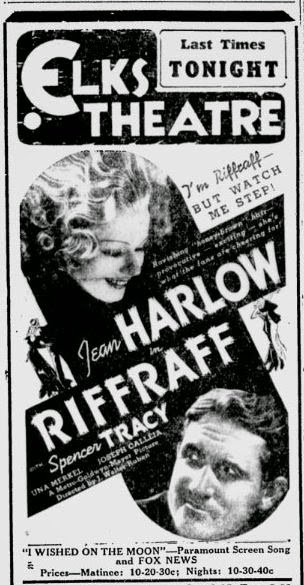 J.
J. Walter Ruben's M-G-M film is a Jean Harlow starring vehicle but it seems like a Spencer Tracy type of movie. Tracy was still new at M-G-M and the studio, in its effort to figure out what to do with him, seemed to imitate models from the actor's years at Fox. This working-class melodrama reminded me somewhat of Raoul Walsh's pre-Code Tracy picture
Me and My Gal in its raucous spirit. 1936 is Code Enforcement time but
Riffraff still feels a lot like a Pre-Code picture and we do get a shot of Harlow in her negligee. The most interesting thing about the movie is its ambivalent attitude toward the struggle between capital and labor. Tracy plays a tuna fishermen convinced by his mentor, "Brains," to halt a strike against the local cannery boss. There's no doubt that the boss is a heel, but Tracy's character is made to understand that a strike will only allow Nick Lewis (Joseph Calleia) to replace the union men with strikebreakers. Understanding this, Dutch (Tracy) tosses a labor agitator off a pier, takes over the meeting and aborts the strike. Apparently the possibility of turning away the scabs never occurs to Brains or Dutch -- or else Metro didn't want the thought to occur to the audience. In any event, his coup makes Dutch a big man, just in time for his wedding to Hattie (Harlow), a cannery worker who was stuck living with her older sister (Una Merkel) and an obnoxious nephew (Mickey Rooney, natch). But while Dutch had steered clear of conflict with Nick on the labor front, once he sees Nick as a rival for Hattie, all bets are off. Against Brains' continued advice, Dutch eventually calls a strike to prove his own dominance, with exactly the consequences Brains feared. The union finally turns against Dutch and deposes him, the insult added to the injury of losing all his installment-plan property during the strike. Again, for all his bravado Dutch never seems to think of fighting the strikebreakers. He doesn't even attempt to persuade them to take his side. Instead, he leaves Hattie and ends up in a hobo jungle where bums talk Marxist jargon without necessarily comprehending it.
To this point Tracy has dominated the picture despite Harlow's top billing. She takes over when Hattie "borrows" money from Nick to help Dutch and gets thrown in jail. She gives birth in prison and turns the baby over to her sister. Finally she joins two fellow femcons in a jailbreak inspired by Dutch; in the film's most dramatic sequence, starkly shot by Ray June, they make their break on a rainy night, but one of them dies trying. While she hides out with her sister's family, Dutch starts a slow rise from the bottom, landing a job as a night watchman. While Hattie remains a hunted fugitive, Dutch becomes a hero once more when he stops some of his radical hobo pals from burning the cannery. In a corny finish -- but I suppose there could be no other -- Dutch's having made good again inspires Hattie to turn herself in and finish her sure-to-be-extended sentence, on the understanding that Dutch and their kid will be waiting for her.
Harlow and Tracy don't have the sort of chemistry Harlow shared with Clark Gable in particular. The Code has less to do with that, I think, than does Dutch's narcissistic personality and Tracy's steamroller performance. Rather than clicking romantically, Tracy tends to blast Harlow off the screen, in part because the actress is more subdued than normal in what was hyped as a change-of-pace dramatic performance. Harlow still shows some attitude and throws some choice insults at Tracy, but she's handicapped by an essentially reactive role for the first half of the picture. The clash of somewhat mismatched stars and the script's curious attitude toward organized labor make
Riffraff more an item of interest than a really good film, but at its best it's entertaining enough to justify that interest.
No comments:
Post a Comment